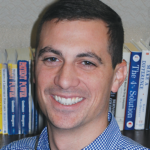On August 9, The Heartland Institute hosted its first 2016 Emerging Issues Forum (EIF). More than 80 state elected officials and policy experts attended the Summer EIF event in Chicago, Illinois.
New Hampshire state Rep. Bill Ohm (R-Hillsborough) praised Heartland’s summer EIF event, stating, “The conference offered excellent presentations by qualified speakers on practical solutions to long-term problems.”
If you missed Heartland’s Summer EIF event, you can watch each of the four panels held during the event online on Heartland’s YouTube channel.
The health care panel featured Cato Institute Senior Fellow Michael Tanner, Opternative Chief Executive Officer Aaron Dallek, and Georgia state Sen. Judson Hill (R-Cobb County). The panelists discussed how states can expand competition and reduce the cost of health care – even with the Affordable Care Act in place. The solutions offered include using telemedicine, rolling back certificate of need laws, and embracing direct primary care. The panel also addressed Medicaid expansion. Video
The education panel featured Goldwater Institute Education Director Jonathan Butcher, Heritage Foundation Fellow Lindsey Burke, and Illinois state Rep. John Anthony (R-Grundy County). The panelists discussed how education outcomes in America continue to lag globally; the ongoing debate about Common Core State Standards; and educational choice options, such as education savings accounts and charter schools. Panelists also analyzed roadblocks to transforming education and explored ways to improve access to a quality education. Video
The energy and environment panel featured Kathleen Hartnett-White, director of the Texas Public Policy Foundation’s Armstrong Center for Energy and the Environment, Heartland Institute Research Fellow Isaac Orr, and Kansas state Rep. Dennis Hedke (R-Butler County). The panelists discussed how America has become a leader in energy production despite President Barack Obama’s efforts to discourage the use of traditional energy sources, such as coal, natural gas, and oil. This panel also discussed the rise of hydraulic fracturing, demise of renewable power mandates, and other pro-environment, pro-energy, and pro-jobs solutions. Video
The budget and tax panel featured Joe Henchman, vice president of legal and state projects for the Tax Foundation, National Taxpayers Union Executive Vice President Brandon Arnold, and Heartland Government Relations Director John Nothdurft. The panelists discussed ways states are seeking to create a better business climate to attract jobs and businesses to their states. The panelists also discussed right-to-work laws, tax reform, and reforming public pension systems and debated which policies are working and which are not. Video
Stay tuned as Heartland prepares to host its Winter EIF in Orlando, Florida on December 15–17.
What We’re Working On
Budget & Tax
Research & Commentary: States Moving Away from Sales Tax Holidays
Since 1980, state and local governments have used sales tax holidays as a popular tool to encourage certain types of consumer activity. Sales tax holidays temporarily exempt or lower state and/or local sales taxes for certain kinds of products. Recently, after years of continued expansions of sales tax holidays amongst the states, the trend has started to reverse. In this Research & Commentary, Senior Policy Analyst Matthew Glans examines sales tax holidays. Glans says they are a gimmick that benefit only a small number of companies and are used to hide larger, more significant problems with a state’s tax code. “Despite their popularity with legislators and some consumers, sales tax holidays are not sound tax policy. Tax holidays attempt to mask the wider problems in a sales tax system by giving consumers temporary relief rather than fixing the actual problem.” Read more
Education
Common Core: A Bad Choice for America (Second Edition)
In 2010, every state but Alaska, Nebraska, Texas, and Virginia adopted Common Core education standards, a set of education requirements for the nation’s elementary and secondary school children that lay out what every student should know at each grade level in math and English language arts. The initiative represents a dramatic centralization of authority over the nation’s historically decentralized K–12 education system. In this second edition of Common Core: A Bad Choice for America, Author Joy Pullmann, a research fellow on education policy, says though proponents insist Common Core originated in a “state-led” process, the truth is a group of private trade organizations commissioned a small group of consultants to write Common Core behind closed doors. “This elite-driven, closed-doors process created a set of what can accurately be described as mediocre mandates. While proponents say Common Core is ‘internationally benchmarked’ and ‘rigorous,’ independent scholars conclude Common Core will graduate students prepared at best for a two-year community college. Several states had better standards in place before they adopted Common Core.” Read more
Energy & Environment
Research & Commentary: Study Says South Texas Fracking Not a Risk to Air Quality
In this Research & Commentary, Policy Analyst Tim Benson writes how researchers at the University of Texas-Arlington’s Collaborative Laboratories for Environmental Analysis and Remediation have conducted a study on ambient emissions at hydraulic fracturing sites in the Eagle Ford shale in Southwest Texas and found the emissions to be within the acceptable federal standard. The study examined ambient benzene, toluene, ethyl benzene, and xylene (BTEX) at fracking sites in 13 different counties using over 12,800 mass spectrometry measurements. While these BTEX compounds did register around fracking sites, their concentrations were very small. The authors also found these emissions are not the result of the fracking process itself; they emanate from various onsite activities that were carried out poorly and inefficiently. Benson says the study reinforces the claim drilling is currently being conducted in Texas in a safe and responsible manner, and Benson says there is no scientific justification for banning hydraulic fracturing or over-regulating it out of existence. Read more
Health Care
Research & Commentary: Florida Should Allow for Dental Therapists
A growing number of states and tribal communities are allowing dentists to employ dental therapists to help meet the growing need for routine dental care. Unfortunately, Florida is one of the many states that has not reformed dental licensing laws to allow for dental therapists. In this Research & Commentary, State Government Relations Manager Logan Elizabeth Pike examines dental therapists in the State of Florida and encourages Florida lawmakers to reform their licensing laws in order to allow for them to practice. “The field of dentistry is changing, and states desperately need to reform the care delivery system to address oral-health needs. Regular access to basic check-ups can prevent the majority of painful and costly dental issues.” Read more
From Our Free-Market Friends
Mackinac Center Event: How Pensions Are Bankrupting Cities and States and How to Fix It
State pension systems across Michigan are facing a crisis that threatens workers, retirees, businesses, taxpayers, and residents who rely on public services. For decades, state legislators and governors, Republican and Democrat, have promised billions more in pensions than have been saved to pay for them. And despite now spending an extra $1 billion more than the state did just five years ago, policymakers still aren’t making the full payment required to pay the estimated costs of its largest pension system. This repeated underfunding has led to large liabilities that will require severe cuts to public services. Join the Mackinac Center in Lansing, Michigan at noon on Wednesday, September 14, 2016, at the Radisson Lansing Hotel at the Capitol to learn about the most significant issue currently facing the state and municipalities in Michigan. This is a free event and is open to the public, legislators, and their staff. Register here




